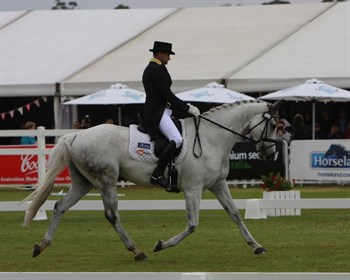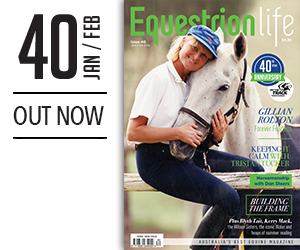|

Shane Rose has labelled Virgil, who is now qualified, as his preferred horse for WEG should he gain selection.
© Michelle Terlato Photography
Australia’s elite Eventing riders and coaches gathered for their annual High Performance Forum at Coogee in Sydney during late December, 2017.
Some of the nation’s biggest names including Rio Olympics bronze medallists Shane Rose and Stuart Tinney along with rising stars such as Hazel Shannon, Emma Bishop and Shenae Lowings spent two days sharing insights and ideas and heard from some of Australian sport’s most respected leaders and mentors.
The forum was a rare opportunity for riders from right across Australia to spend time together off their horses and enabled them to bond and plan and prepare for their major targets such as next year’s FEI World Equestrian Games in Tryon, USA.

Emma Bishop.
© Jenelle Christopher
Equestrian Australia High Performance Director Chris Webb said; “The HP riders Forum was a great opportunity at the end of season 2017 to take stock with our new program. Both the athletes and coaches in our Gen Next program were exposed to where we want to be in the lead up to Tokyo and beyond.”
“Delivering a holistic program will assist in delivering our long-term goals. The guys are fully invested and worked very well as a team together,” said Webb.
The line-up of speakers across the two days included Daniel Greenwood, a Senior Skill Acquisition Scientist at the Australian Institute of Sport with well over a decade of international applied sport science experience.
Daniel has had roles at the Queensland Academy of Sport, the Singapore Sports Council and now the Australian Institute of Sport and has worked with athletes and coaches from a variety of backgrounds and at all levels of the developmental pathway. His career highlights include being the technique scientist behind Sally Pearson and Mitchell Watt in Athletics, and Ashleigh Gentle and Ryan Bailie in triathlon, and the coaching scientist behind the national synchronised swimming program and national gymnastics development program.
Daniel’s background is in biomechanics and the foundations of movement, but his PhD was completed at the Queensland University of Technology in skill acquisition and the science of learning. He works closely with athletes and coaches to solve applied problems and has published research exploring the mutual benefit of combining coach and scientist knowledge to better understand sport performance in complex performance environments.
Behavioural strategist Warren Kennaugh also addressed the group. He specialises in the development of elite athlete capability. Within his role he is responsible for the assessment, design and implementation of development and coaching programs for elite athletes and coaches within high profile sports.
Some of the presentations included;
Developing Skill for Performance under Pressure
While there is undoubtedly a strong link between the time spent practicing a skill and improvement in performance of that skill, as expertise levels increases, further improvements require the investment of more and more hours for gradually smaller and smaller advances. For elite athletes ‘time’ cannot be the sole solution to improve skill. There is simply not enough of it. Consequently, a targeted, thoughtful and progressive approach to skill development is required because ‘how’ you practice can be much more important than ‘how much’ you practice.
Designing Training for Performance under Pressure
This provided information to ensure those involved have a practical understanding and ‘how to guide’ for modern skill performance training design. With understanding of the unpredictable world of sports performance at the highest level. This session highlighted the importance of developing adaptable behaviour to prepare athletes for whatever comes their way.
Stuart Tinney, who has attended a number of these High Performance forums during his riding career said;
“So much more sports science going into data and training and we are learning more about what to do with it and to perform better and that’s very important.”
“It gets much more technical and involved. Whilst we are still communicating with the horse and we can’t rush them this helps us to be better at it and progressive.”
“We were in front of the rest of the world years ago and to stay there is a tough thing to do,” said Tinney.
He also cited the importance of the involvement of Gen Next riders.
“The true benefit is getting these new riders that are coming on to programs and get them together and interacting with other riders and learning strategies on how we do things. Getting educated by people that are knowledgeable in this sort of thing is wonderful.”
“It’s also great to get together with these people because they are my friends as well,” Tinney said.

Stuart Tinney and War Hawk.
© Roger Fitzhardinge
Shane Rose, who recently returned home after a successful international stint said the two-day forum was positive for team building at the end of what has been a busy year.
“I think it’s nice to get away from your normal environment and see your peers in a different setting.”
Rose is now heavily focussed on preparation for the FEI World Equestrian Games in Tryon next September.
He has labelled Virgil, who is now qualified, as his preferred horse for the event should he gain selection.
“I think he has as strong chance of individually getting a medal. He has improved significantly on the flat and jumps as good as any horse in the world.”
“I think he can produce a test that will be competitive and I am confident with him I can finish on that score.”
Rose also spoke positively about the current form of Australia’s elite riders.
“I think we are trending in a positive manner towards Tryon and Tokyo. Michael Jung and Ingrid Klimke are the benchmarks currently and we are getting a lot closer to that. There are also some great riders in countries such as NZ and the French have some great riders.”
“One thing is that not many of the countries have got massive depth so if a couple of those riders at the top fall away then it would get interesting. If we can get our best five to Tryon I am confident we will give WEG a good crack and be very competitive,” Rose said.
Source: Equestrian Australia (EA) website
READ THE LATEST NEWS ARTICLES HERE

|

